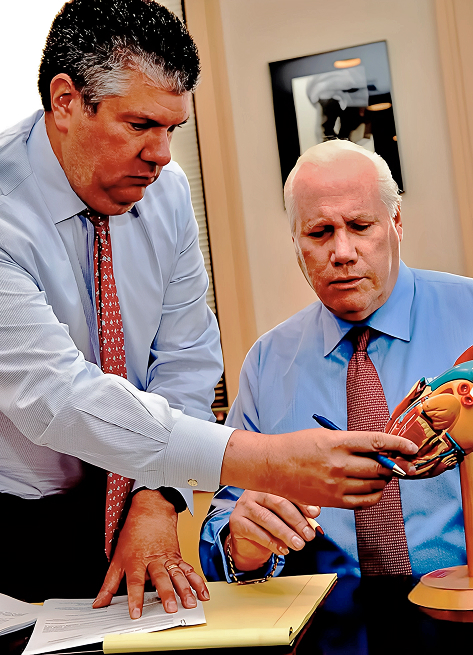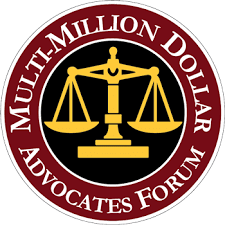Injured on the Job as a Union Worker? Know Your Legal Options
New York union workers help build, maintain, and operate some of the country's most critical infrastructure and services. Whether you're a construction laborer, transit employee, electrician, or sanitation worker, your work is essential and often dangerous.
When injuries happen on the job, union workers may face mounting medical bills, reduced income, and uncertainty about the future. If you're a union employee who has suffered an injury at work, know you have rights. A New York union employee injury attorney will help.
The path to compensation may involve more than filing a workers' compensation claim. Depending on the circumstances, you may also be entitled to a personal injury lawsuit, particularly if a third party was involved or safety standards were ignored.
Protecting your livelihood, health, and family means holding the responsible parties accountable.
Schedule a Free Case Evaluation
New York Union Employee Injuries Guide:
- Types of Union Jobs Most at Risk for Workplace Injuries
- Your Rights as a Union Worker After a Workplace Injury
- What Kind of Compensation Can a New York Union Employee Receive?
- The Battle Against Insurance Companies: What to Expect
- Steps to Take in the Days Following a Union Job Injury
- Can You Sue If You're a Union Worker?
- Common Mistakes That Can Hurt Your Case
- Speak to a New York Union Employee Injury Lawyer Today
Why Choose Queller Fisher as Your New York Union Employee Injury Lawyer

When recovering from a workplace injury, who you choose to represent you can make a significant difference in the outcome of your case. New York’s legal system is complex, and union-related cases come with their own specific regulations and contractual protections.
Our personal injury team has a long history of fighting for injured workers across New York City and the surrounding counties.
Here’s what sets us apart:
- Decades of success: We’ve represented union members for over 60 years and have recovered over $1 billion in verdicts and settlements.
- Deep knowledge of union labor law: We understand union contracts, collective bargaining agreements, and how they interact with state labor law.
- Aggressive case building: We collaborate with safety experts, engineers, and medical professionals to build compelling claims.
- Courtroom strength: Our attorneys are ready to go to trial if negotiations fail.
- Local experience: We know the courts, judges, and legal climate in New York City, the White Plains, and surrounding counties.
- Multilingual Support: Legal support is available in Spanish, Portuguese, and Chinese to ensure clear client communication.
Types of Union Jobs Most at Risk for Workplace Injuries
Union jobs often involve physically demanding, high-risk work. While all workers deserve protection, specific union industries see more injuries due to the nature of the work and exposure to hazardous environments.
Some of the most commonly affected union sectors include:
- Construction: Including carpenters, ironworkers, electricians, pipefitters, and laborers
- Transportation: Such as MTA employees, subway operators, bus drivers, and Amtrak workers
- Utility workers: Including Con Edison workers, telecommunications workers, and water system employees
- Public service employees: Such as sanitation workers, school custodians, and maintenance workers
- Manufacturing and Industrial Workers: Including machinists and factory employees
Common causes of injuries in these sectors include:
- Falls from heights or scaffolding
- Being struck by heavy machinery or falling objects
- Exposure to electrical currents or hazardous chemicals
- Repetitive stress injuries from lifting, bending, or operating machinery
- Lack of safety equipment or protocol enforcement
- Vehicle collisions during job-related transportation
Your Rights as a Union Worker After a Workplace Injury

Union workers in New York are entitled to specific protections, and being part of a union can help reinforce your legal rights. However, those protections don't automatically guarantee fair treatment or full compensation when injuries occur.
Here’s what you should know:
- Workers’ compensation: This is the first level of coverage and is supposed to provide medical care and lost wage benefits. However, it does not cover full lost income or pain and suffering.
- Third-party claims: If a subcontractor, equipment manufacturer, or property owner contributed to the accident, you may have grounds for a personal injury lawsuit in addition to workers’ comp.
- Labor Laws 240 and 241: These unique New York State laws provide special legal protections for construction workers injured by elevation-related hazards or unsafe job site conditions.
- Collective Bargaining Agreements (CBAs): Your union contract may provide additional benefits or restrictions. An attorney familiar with both labor law and union rights can help you interpret these terms.
- FMLA and Disability Rights: You may be eligible for protected leave or long-term benefits depending on the severity of your injuries.
Knowing the difference between workers’ comp and a third-party lawsuit is essential. Many injured workers settle for less than they’re entitled to because they believe they can only file one type of claim.
What Kind of Compensation Can a New York Union Employee Receive?
Compensation in union employee injury cases varies based on the type of claim filed and the specifics of the injury. In some situations, you may be able to recover significantly more through a personal injury claim than workers’ compensation alone can provide.
Here are the types of compensation union workers may be eligible for:
Through Workers’ Compensation:
- Payment of medical bills and prescriptions
- A portion of lost wages (usually two-thirds of average weekly pay)
- Disability benefits (temporary or permanent)
- Vocational rehabilitation if returning to your job is not possible
Through a Personal Injury Lawsuit:
- Full lost wages (past and future)
- Loss of future earning capacity
- Pain and suffering
- Loss of enjoyment of life
- Emotional distress
- Punitive damages (in cases of gross negligence)
Because workers' comp benefits are limited and do not include pain and suffering, it's important to determine whether another party, such as a contractor, property owner, or defective equipment manufacturer, contributed to your injury.
The Battle Against Insurance Companies: What to Expect

Union workers injured on the job often assume their claims will be processed fairly, especially when their contracts promise certain protections. Unfortunately, insurance companies are known for tactics that delay or reduce payouts.
Whether you’re dealing with a workers’ compensation insurer or a third-party insurer, you're not on a level playing field without legal support.
Common challenges injured union workers face from insurers:
- Denial of claims or delayed payment
- Claims that the injury occurred outside of work
- Refusal to cover specific treatments or specialists
- “Independent” medical evaluations that downplay the injury
- Pressure to return to work before you're ready
- Lowball settlement offers before long-term costs are known
Insurance adjusters are trained to minimize payouts and protect their bottom line. Without strong legal representation, many injured workers accept settlements that don’t fully cover their medical costs or lost income.
You don’t have to go in blind. With an attorney on your side who knows the system and has handled hundreds of injury claims for union workers, you’ll be in a stronger position to fight back.
Steps to Take in the Days Following a Union Job Injury

After a workplace injury, what you do in the following days and weeks can influence the strength of your claim and the compensation you may ultimately receive.
While medical treatment should be the priority, there are other steps union workers can take to protect their rights.
- Follow all medical advice: Attend all follow-up appointments and comply with treatment recommendations. Gaps in care can be used against you by insurers or opposing attorneys.
- Report to your union representative: If you haven’t already, notify your union steward or representative. They may assist in filing internal incident reports or help you access benefits through your collective bargaining agreement.
- Document the injury: Keep a written record of your symptoms, pain levels, and how your injury affects your day-to-day life. Also save medical records, prescriptions, and receipts related to treatment.
- Preserve evidence: If you can, take photos of the accident site, equipment involved, and any safety hazards. This documentation may support a third-party personal injury claim.
- Track lost wages: Keep records of any days missed from work, lost overtime, or reduced duties and hours.
- Avoid recorded statements: Insurance adjusters may contact you for a statement. Decline to give one until you’ve spoken with a lawyer, as your words can be used to limit your compensation.
- Review your union contract: Your collective bargaining agreement may contain information about your rights to medical leave, job reinstatement, or other protections.
- Schedule a legal consultation: Speaking to a lawyer early in the process allows your case to be investigated while evidence is still fresh. It also ensures you don’t unknowingly sign away your rights.
- Being proactive in these early weeks: helps protect the strength of your claim and positions you to receive the full compensation you’re owed.
Can You Sue If You're a Union Worker?
One of the most common misunderstandings among injured union employees is that they’re limited to workers' compensation. In fact, New York law allows certain injured workers to bring additional claims, depending on the circumstances of the injury.
You may be eligible to file a personal injury lawsuit if:
- A third-party contractor (not your employer) caused or contributed to the unsafe condition
- You were working at an unsafe construction site in violation of New York Labor Law 240 or 241
- A property owner failed to maintain a safe work environment
- Defective equipment or machinery played a role in your injury
- You were involved in a vehicle collision during your job
These third-party claims can result in far more comprehensive compensation than a workers' comp claim. This is especially true when the injury results in permanent impairment, disability, or the inability to return to your previous work.
It’s also important to act quickly. New York’s statute of limitations typically gives you three years from the date of injury to file a personal injury lawsuit. Still, that window can be shorter in cases involving public entities.
Common Mistakes That Can Hurt Your Case

Even strong injury claims can be undermined by avoidable errors. Union employees must balance medical recovery with paperwork, insurance communication, and legal timelines, making it easy to misstep.
Knowing what to avoid can help you preserve your rights.
Here are some common pitfalls:
- Waiting too long to get legal advice: This can result in missed deadlines or overlooked claims.
- Trusting insurance adjusters to act in your best interest: Their goal is to minimize payouts.
- Returning to work too soon: This can not only worsen your injury but be used to argue that your claim isn’t serious.
- Posting on social media: Insurance defense teams may still use photos or posts that seem unrelated.
- Assuming you can’t sue: Workers may rule out personal injury claims without knowing all the facts. An attorney can help determine liability beyond your employer.
- Not keeping detailed records: Documentation strengthens your case. Always keep copies of every communication, form, or bill.
Legal guidance ensures your case stays on track and you don’t forfeit compensation due to technicalities or insurer pressure.
Long-term consequences of workplace injuries for union workers
Injuries on the job can affect union workers beyond the initial recovery period. Severe injuries may lead to long-term physical limitations, chronic pain, and reduced earning potential.
Many workers may leave their trade, miss out on pensions, or lose the benefits of long-held union membership.
Consequences may include:
- Permanent disability and medical needs
- Inability to perform job functions tied to union seniority
- Delayed retirement or loss of pension contributions
- Loss of union health insurance if unable to work required hours
- Emotional toll on workers and their families
A strong legal advocate can fight for damages that reflect your full situation, not just your immediate injury.
Choosing the Right Representation Makes a Difference
Union work requires strength, skill, and commitment. When that work leads to an injury, you deserve the same dedication from your legal team.
Look for an attorney with specific experience representing union members and a deep knowledge of New York’s labor laws, construction codes, and court system.
A qualified New York union employee injury lawyer will:
- Investigate third-party liability and maximize your compensation options
- Review your union contract and ensure contract benefits are honored
- Coordinate with your union reps, medical providers, and experts
- Handle negotiations with insurers and defense attorneys
- Take your case to trial if a fair settlement isn’t offered
Speak to a New York Union Employee Injury Lawyer Today
The attorneys at Queller Fisher are committed to standing with New York’s union workers. With offices in New York City and the White Plains, we’ve represented injured workers across the five boroughs and surrounding counties for over six decades.
Let us help you pursue the full compensation you deserve.
Call 212.406.1700 today for a free, confidential consultation. You won’t pay a fee unless we win your case.
Schedule a Free Case Evaluation